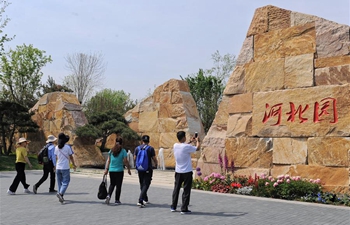
Samphan Lertnuwat(2nd R, front), leader of Thai Citizen Power Party, gives the 11 one-seat parties' statement of supporting Prayut Chan-o-cha to be elected as new prime minister to Uttama Savanayana (2nd L, front), leader of pro-Prayut Palang Pracharath party, after a press conference held in Bangkok, Thailand, May 13, 2019. Eleven Thai political parties which won one seat each in Thailand's March 24 elections said on Monday that they would vote for incumbent Prime Minister Prayut Chan-o-cha to be elected as new prime minister. (Xinhua/Yang Zhou)
BANGKOK, May 13 (Xinhua) -- Eleven Thai political parties which won one seat each in Thailand's March 24 elections said on Monday that they would vote for incumbent Prime Minister Prayut Chan-o-cha to be elected as new prime minister.
The eleven parties said during a press conference held in Bangkok that they supported pro-Prayut party Palang Pracharath, which won 115 seats, in leading a coalition government, and they would join the coalition government.
"We do this because we want to dismiss uncertainty for Thailand," one party leader said, adding that they support Palang Pracharath party and Prayut "unconditionally."
The Palang Pracharath party leader Uttama Savanayana expressed his gratitude to the 11 parties, saying his party was confident to lead a coalition government to run the country in the near future.
Ten parties of the 11-party group won less than 71,000-plus votes, or the threshold to win a seat in the House of Representatives, with the only exception Thai Nation Power Party winning about 73,197 votes.
The 10 parties and another pro-government party, the People Reform Party, entered the lower house after the Election Commission announced the list of 149 proportional party-list Members of Parliament (MPs) on May 8, which was opposed by the opposition Pheu Thai Party and Future Forward Party.
The People Reform Party showed its support for Prayut since the beginning of its founding and the 11 parties showing up Monday said the People Reform Party may join their group later.
Earlier, there were different understandings of Section 128 of the MP election organic law, which led to two formulas of party-list mode MP allocation with one giving the opposition side more seats and the other lessening their seats, giving seats to many small parties.
The EC applied the latter, giving the 11 parties which won less than 71,000 votes to enter the lower house along with 16 parties which won more than the average votes to win a seat.
The 500 elected members of the House of Representatives of Thailand's National Assembly, together with 250 senators selected by the National Council for Peace and Order led by Prayut, would soon vote for a new prime minister.
With the 250 senators supposed to vote for Prayut, adding the 115 seats of the Palang Pracharath Party and 11 seats of these parties at the lower house, the pro-Prayut side is likely to have more than half of all 750 seats of the National Assembly at hand, enabling it to form a coalition government.











